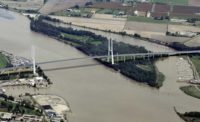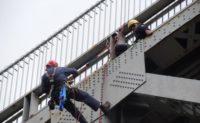Two aging bridges connecting Cape Cod with mainland Massachusetts are set for a tune-up as plans progress to replace both with modern spans. The US Army Corps of Engineers, effectively their owner, has hired a local contractor for roughly $4.2 million worth of maintenance and repair work on the spans, which date to the 1930s.
Stoughton, Mass.-based R. Zoppo Corp. will start work March 1 on the Sagamore Bridge, perforimng repairs to bridge roadway concrete and pavement, as well as to steel supports, concrete abutments and joints, the Corps said. Traffic on the bridge is reduced to a single, 12-ft lane in each direction, with closures around the clock, said the agency.
Maintenance work is also planned for bridge drainage systems and lighting.
Work on the Sagamore is slated to be completed by Memorial Day weekend, while similar maintenance and repair work is set for the Bourne Bridge in September and October.
State transportation officials also are working with the Corps on plans to replace the two bridges, with design plans moving forward, despite the current lack of federal funding.
The bridges, the only highway connection between Cape Cod and its 215,000 residents and mainland Massachusetts since they opened in 1935, have been overtaxed and outmoded for decades and are choke points for miles-long traffic jams during summer tourism season.
In a major decision, twin bridges will be built side by side where the Sagamore and Bourne bridges now span the Cape Cod Canal, roughly 5.7 miles apart.
The Massachusetts Dept. of Transportation recently picked the arch design for the new spans, similar to their current bridges,
The arch design was also chosen among 2,200 respondents in a public survey conducted by the department, with more than two-thirds giving that design the highest rating, according to state transportation officials.
Acable-stayed bridge design came in second, while the concrete box girder option earned just 1.7 stars out of a possible five..
Under current plans, state transportation officials would seek bids in September 2025 from companies and joint ventures for the design-build project.
But the state DOT and the Corps have lost on two separate bids to procure nearly $1.9 billion in federal money for the project, which is expected to cost about $4 billion.
State lawmakers have approved $350 million for the project as part of a state transportation bond bill, while the DOT has spent $25 million to date to advance it, with funding so far covering conceptual engineering, traffic data collection, pilot borings and geophysical explorations.






Post a comment to this article
Report Abusive Comment